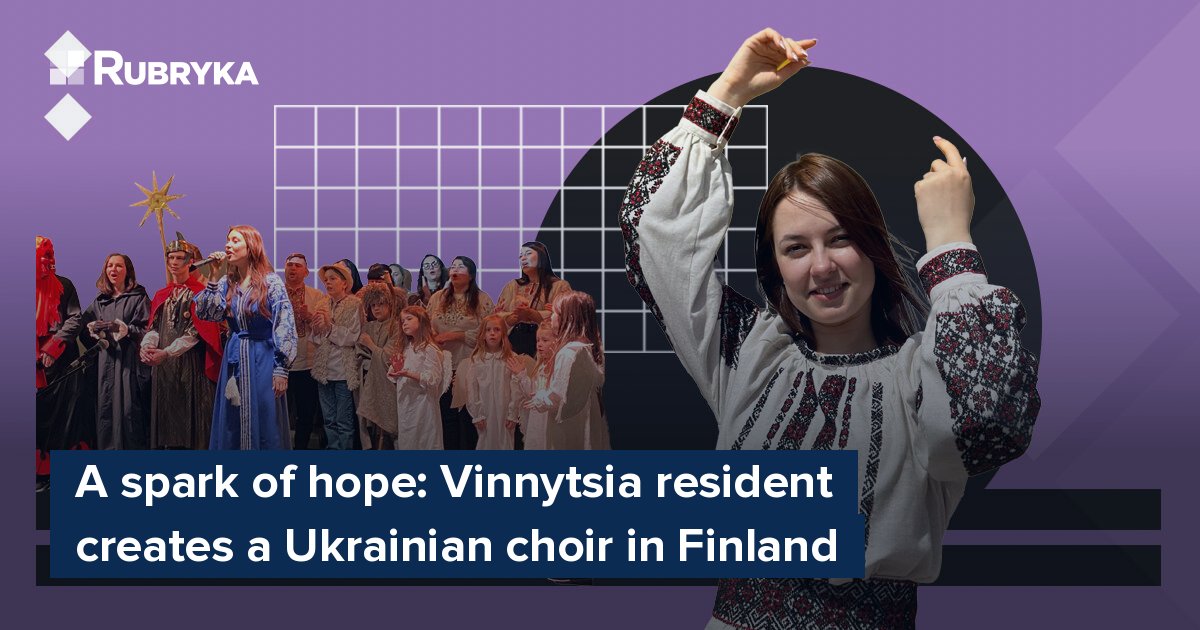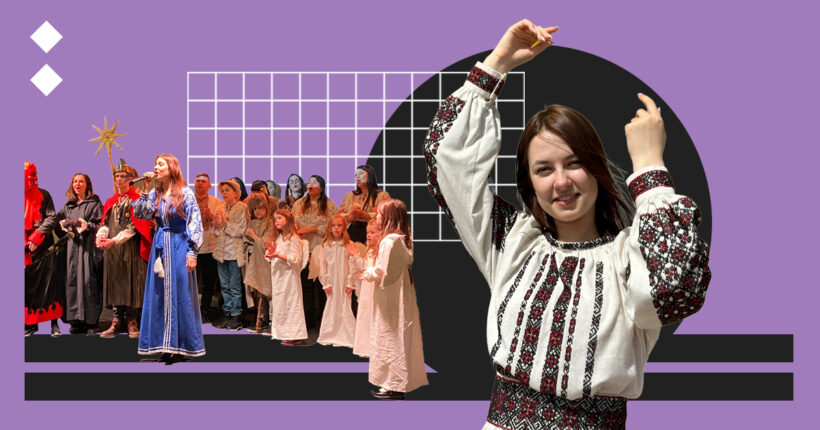
Sofiia Yakovyshyna comes from the town of Trostyanets in the Vinnytsia region. She has been fond of vocals since childhood and cannot imagine her life without a song.
"My dad used to sing in the choir, and so did my great-grandmother. Mom learned to play the accordion, but no one was engaged in music professionally," Yakovyshyna shares.
Before the full-scale invasion, she lived an ordinary life: she graduated from the Vinnytsia College of Culture and Arts named after Leontovych, studied at the Vinnytsia Pedagogical University, and taught vocals at a music school.

Sofiia Yakovyshyna. Photo from the heroine's archive
What is the problem?
I really missed the Ukrainian song
In the first months of the full-scale war, Yakovyshyna, like most Ukrainians, felt completely confused and afraid.
"Besides teaching at a music school, I earned a living by singing at weddings, restaurants, and various celebrations. I dreamed of creating my own band, and then everything stopped, and there was a complete lack of understanding of how to live on," recalls the singer.
Yakovyshyna was invited by her aunt, who lives in Finland. The Ukrainian singer left and two weeks later started working for a cleaning company in Espoo, a town not far from Helsinki. For accommodation, she rented a small room near the office. Later, Yakovyshyna managed to find a more comfortable home. She could make a living, but her soul longed for a Ukrainian song.
"I missed my children at the music school. Leaving them, especially the smallest ones, was a difficult decision. I really wanted to work with children and also sing myself," the singer shares. "I just wanted to go to a Ukrainian artist concert."

Yakovyshyna, with a young audience member who came on stage to help sing, "Oh, the Red Viburnum in the Meadow." Photo from the heroine's archive
In addition, like all neighboring countries of Russia, Finland knows what Russian expansion is. Therefore, it knows very little about Ukrainian culture, which is not spoiled by hostile influence and propaganda. Yakovyshyna wanted to change this and promote Ukraine, where she is now forced to live.
What is the solution?
Create a children's choir and start
Yakovyshyna began looking for opportunities where she could sing or work with children.
"I didn't know anything about Finland, and I didn't know what was there. Once, my aunt said there was a Society of Ukrainians in Finland with a choir. She advised me to try to join them, so I started looking," Yakovyshyna recalls. "While trying to find contacts of the choir, I got to know wonderful people and offered them to create a vocal group for children."
So, at first, Yakovyshun created a small choir for Ukrainian children on the basis of the association and started holding classes twice a week.

Yakovyshyna and her singing team in Finland. Photo from the heroine's archive
"I continued to work in cleaning, but this choir was such an inspiring act for me. It was the only thing I could do here with Ukrainian music. We performed at small events in libraries, and then the group began to expand. We began to sing at concerts," the singer shares.
Initially, the Yasni choir was attended by children aged eight to 12. About 20 children come to classes, divided into two age groups: six to 12 and 12 to 14. Most of them moved to Finland with the start of a full-scale war. Only three or four had lived here before.
How does it work?
"When the children are invited to sing, it is a small spark of hope"
The Society of Ukrainians in Finland is an organization that has been working for many years. In April 2022, the Ukrainian Nadiia Maksym'yuk created the Ukrainian Center at the Society.
They conduct various activities to integrate Ukrainians into the Finnish community, teach the language, and organize concerts and educational and integration courses.
"At the beginning of the Ukrainian Center activity, Yakovyshyna approached me with the offer to share her vocal teaching skills. This is how the idea to create a choir for Ukrainian children arose. Now, our children's choir is already recognizable among the Ukrainian community and in the Finnish environment. We are actively invited to perform at important events," says Maksym'yuk.

Participants of the Ukrainian concert. Photo from the heroine's archive
Yakovyshyna's proposal for the Ukrainian Center turned out to be very timely. Thanks to the singer's efforts, Ukrainian children can now spend their free time more diversely — they communicate with other young Ukrainians and, therefore, do not forget about their native culture.
"When they first started classes, we didn't have a piano, and then a Finn donated the instrument. At first, they sang in a small room, and later, when more children joined, they were allocated a more spacious room. There is a playroom for children and a kitchen for parents, where they can drink tea while waiting for their children from class.
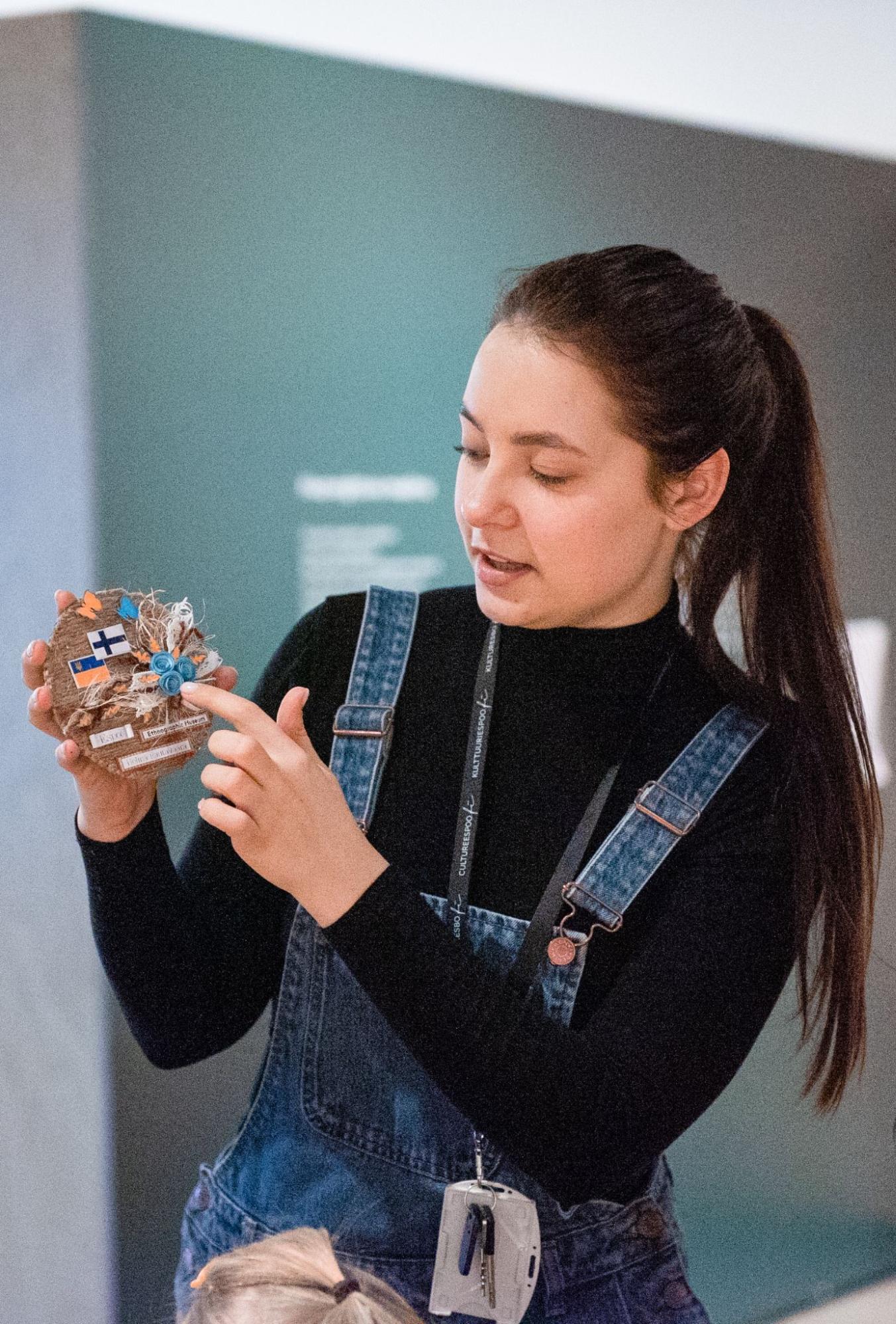
Yakovyshyna during one of the master classes for children. Photo from the heroine's archive
Sung with Okean Elzy
Many events are held in Finland to support Ukraine and to spread and preserve Ukrainian culture and traditions. For Yakovyshyna, participating in such performances is an absolute pleasure and her own part of the struggle for Ukraine.
However, cases are spreading when concerts are organized by pro-Russian organizations under the guise of mentioning Ukraine in the title. For example, in the fall of 2022, announcements about the concert "The Baltic Sea Sings for Ukraine" began to spread in the Finnish mass media. However, it turned out that this was a continuation of a long-term project aimed at strengthening cultural ties between Russia and Finland. Ukraine was mentioned in the title just for cover.
"Just a couple of weeks ago, we went with a Ukrainian concert to neighboring cities near the capital region. It is very important for me because now the Russians have started organizing concerts on the Ukrainian theme, so the transmission of Ukrainian culture has become even more important," says the singer.
Recently, the Yasni choir sang the song "Obiymy" on the same stage with a famous Ukrainian band, Okean Elzy. On November 27, the Yasni children's choir will participate in the big Ukraine sounds concert in Helsinki's largest concert hall.
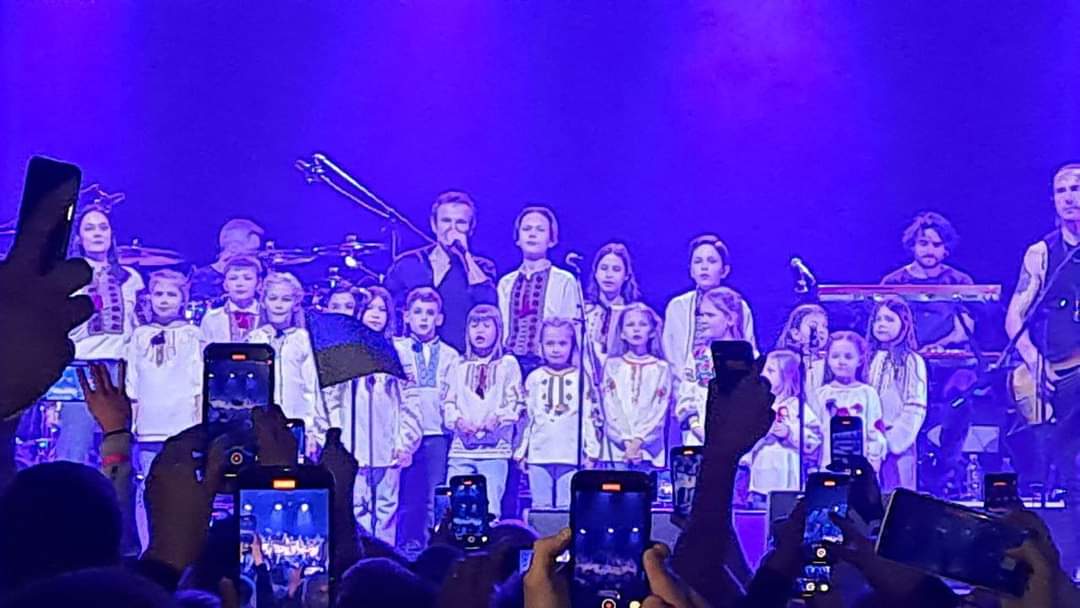
Choir Yasni and Okean Elzy.
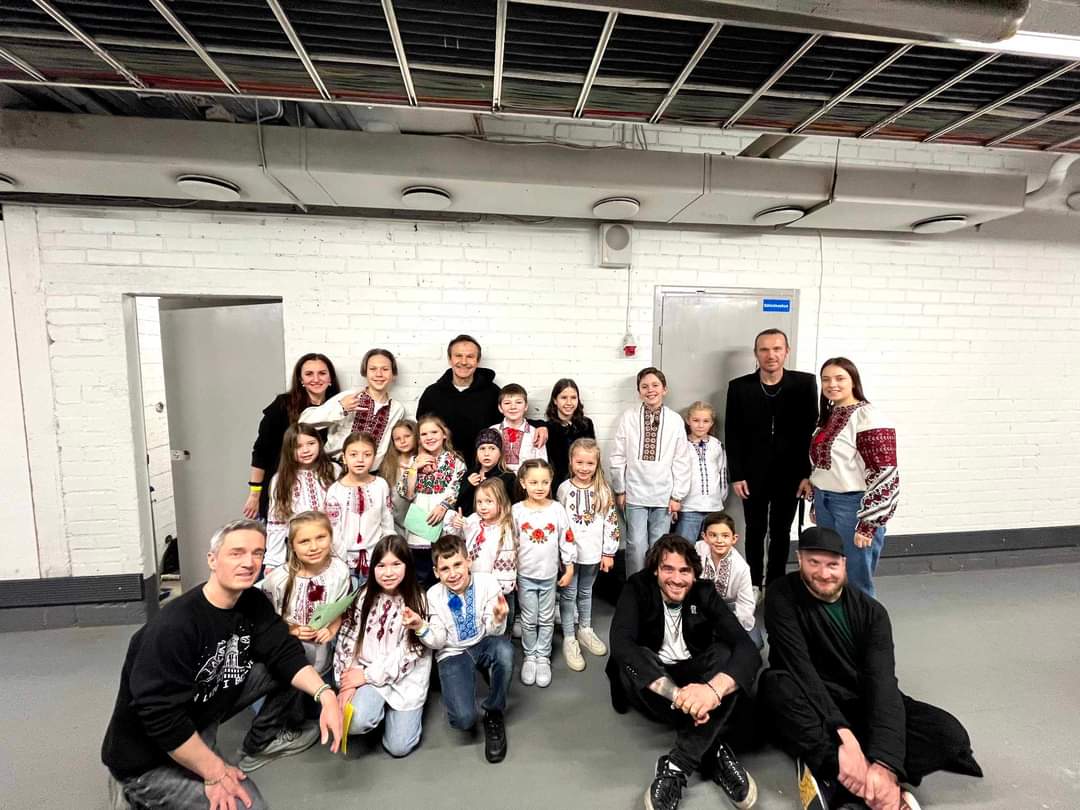
Choir Yasni and Okean Elzy.
In Helsinki, Yakovyshyna met Maryna Kramarenko, a talented pianist from Ukraine. Now, they perform folk and modern songs in their own arrangement.
"I met Yakovyshyna in Helsinki last summer, shortly before the Independence Day of Ukraine. The first song we performed together was Ukraine's national anthem. Since that moment, there have been many performances, and it is always exciting, emotional, and very sincere for me," Kramarenko shares.
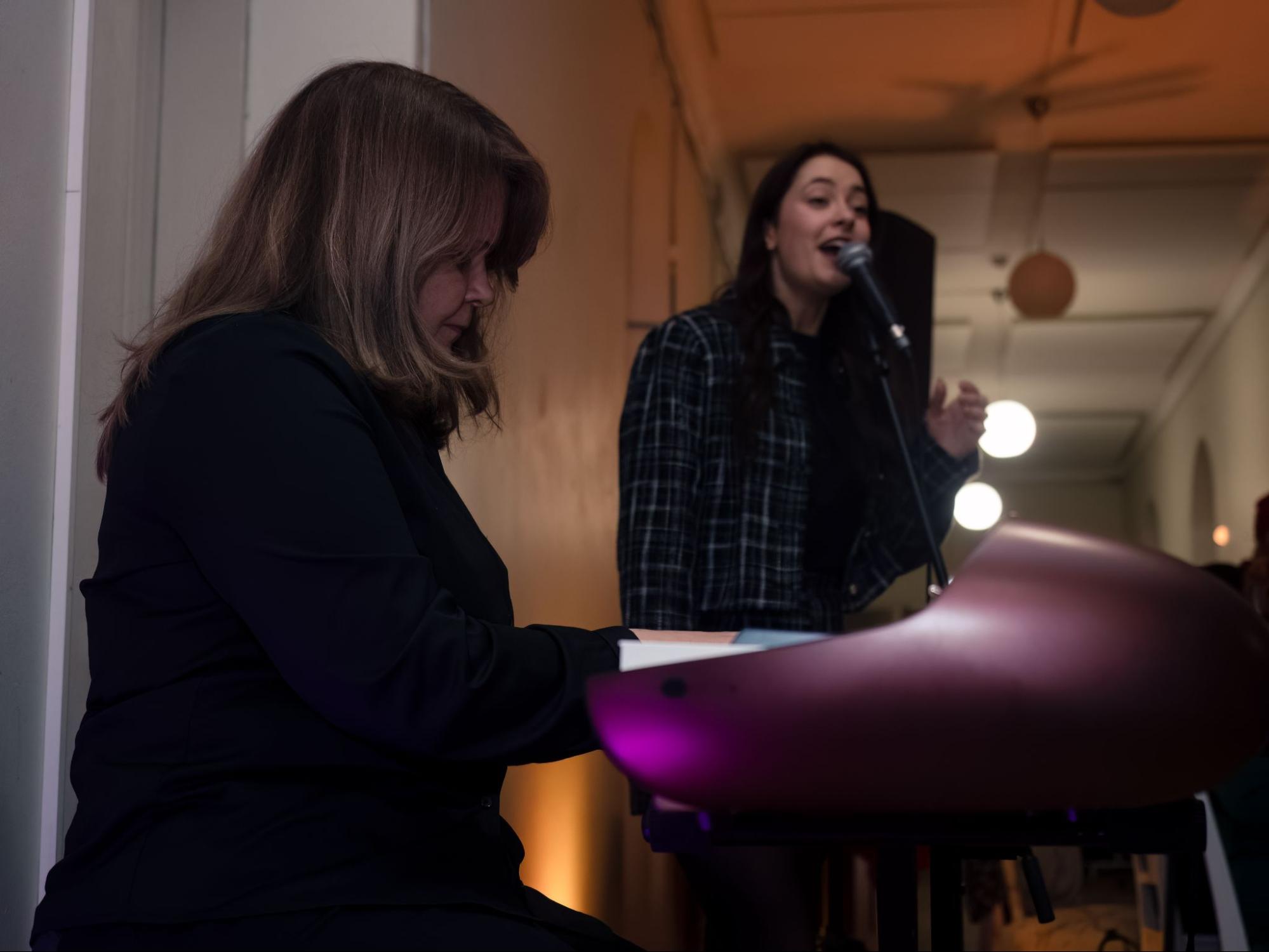
Performance with Maryna Kramarenko. Photo from the heroine's archive
Street actions are a reminder that the war in Ukraine is not over
The Ukrainian song performed by Yakovyshyna and her pupils is also heard at various rallies. The singer admits that the music attracts more people, and even passers-by stop to see and listen to what is happening.
"When there is music at the rally, it attracts more attention, and the street actions themselves are a reminder that the war in Ukraine is not over. Some people have left Ukraine, but we must not stop helping Ukrainians. I feel my responsible role in this," Yakovyshyna shared with Rubryka.

Sofia Yakovyshyna with the Ukrainian flag. Photo from the heroine's archive
According to Yakovyshyna, rallies are held regularly in Finland's capital region and organized by the Ukrainian Society.
"Earlier, rallies were organized every two weeks, and now it's getting cold, so they happen once a month. Usually, they are dedicated to some events, for example, the Day of the Cossacks or honoring the memory of the deceased," says the Ukrainian.
According to Yakovyshynaa, the Ukrainian song is about hope.
"Usually, at seminars dedicated to Ukraine, they talk about the terrible events of the war, Russian bombings, and deaths. And when the children and I are invited to sing, it is about a small spark of hope, a positive note from the Ukrainian side because we show that Ukraine can be heard not only because of war. We also have culture and creativity. We come to bring that piece of culture to the country that sheltered us," reflects Yakovyshyna.
I found a job that also helps Ukrainians
Classes with the children's choir inspired Yakovyshyna, but the singer also wanted to work in a field close to her education and passion.
"I was constantly looking at vacancies, but knowledge of Finnish and English is required everywhere. My English was good enough for communication but not enough for work. Once, I saw that the library needed a teacher to work with Ukrainians. There were five pages of application, and the deadline was almost here. I filled out that resume, and then I thought I should send it somewhere else as well," the singer laughs.
Yakovyshyna started googling other vacancies and found a position as a hobby art instructor at the Department of Culture of Espoo.
"This was a trial project. Various free clubs were created at schools so every child could find their hobby. I was invited for an interview and then received a message that I was unsuitable for them. A few days later, they called and said there was a mistake and invited me to work half-time as an art instructor."

Sofia Yakovyshyna. Photo from the heroine's archive
Yakovyshyna was most attracted by the fact that the project was a pilot project, so employees were given freedom of action. No one knew how to do it, so they could be creative at their discretion. Initially, she was offered three working days. The girl started working even without a computer. Gradually, the process began to improve, and the first schools that volunteered for such classes were found. Then, the municipality received a grant for a new project for Ukrainians, and Yakovyshyna was hired full-time.
"My task in the project is to coordinate the process. I had to create a database of Ukrainians interested in classes, find Ukrainian instructors, find premises, create registration forms, purchase materials, and figure out how it would happen with the instructor. The master classes were very diverse. It was dancing, drawing, and making candles, various souvenirs, magnets, etc.," the Ukrainian says.
The project is also aimed at grouping displaced people. "It's such a safe place where people can come, relax, and create something interesting together," says Yakovyshyna.
While working on the project, Yakovyshyna found many talented Ukrainians who began not only to participate in master classes but also to conduct them themselves.
Seventy percent of the instructors are Ukrainians. This is also self-realization for them. Since their specialization in Finland is not confirmed, they cannot work in their profession. And here, at master classes, they can share their skills.
In addition, it is also an introduction to Ukrainian culture. "For example, we used to draw based on Maria Prymachenko's paintings. We also made decorative horseshoes to decorate the house. People came, and they didn't have anything Ukrainian with them. And here they created the decor with their own hands, even with Ukrainian motifs," shares the project manager.
Yakovyshyna also provides information services for Ukrainians. For example, when parents are looking for classes for their child, she selects groups that work in their area and provides contacts.
The city of Espoo, where Yakovyshyna lives, is twinned with the Ukrainian city of Kryvyi Rih. Educational institutions in the cities are already cooperating, and now the culture department is considering what interesting project could be implemented.
Yakovyshyna made great efforts to find a job that matched her talents and to create a choir, thanks to which the Ukrainian song resounds in Finland. Everything that she lacked in a foreign country appears little by little. The most important needs are closed. All that remains is sadness for family and home.

"We will simply lose them": how a scientist unites Ukrainian scholars abroad

"Problems of Ukrainians must be heard on such platform:" Ukrainian project at Paris Peace Forum presents sustainable solution for communities



